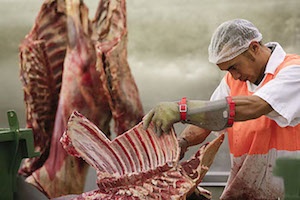Devastating floods hit Brazil's poultry industry, causing heavy losses

The catastrophic floods caused damage estimated at 182.9 million reais ($35.8 million), according to ASGAV, a local association of poultry producers. The flooding affected approximately 20 poultry farms and submerged feed mills, resulting in the death of approximately 279,000 broiler chickens and 150,000 laying hens. In addition, due to the flood, the work of four MEAT processing plants was stopped, but it has not yet been specified which enterprises were affected.
The floods have not only damaged the poultry industry, but also the wider agricultural sector in Rio Grande do Sul. The state is Brazil's most important meat EXPORT hub, accounting for 16.23% of the country's chicken exports. The port of Rio Grande, vital for exports, was also hit by landslides and blocked roads and rail services, further exacerbating the situation.
Rio Grande do Sul's wider agricultural community also faced serious challenges. Waldecir Folador, HEAD of local pork producers' lobby ACSURS, said pig farmers had lost about 12,600 pigs as entire towns were flooded. These included suppliers of large meat processing companies BRF andJBS . Folador stressed that the total number of pigs in the state is about 5 million, and the full extent of the indirect losses is still being assessed. These losses are compounded by roadblocks that make it difficult to access basic goods such as food and water.
The flooding forced farmers to ration feed, leading to lower animal weights and potential long-term impacts on production. Farmers supplying the BRF plant in Lajeado were particularly hard hit, with estimates that they lost at least 60% of their pigs due to the rains. This plant alone is capable of processing 3,000 pigs per day, highlighting the scale of the impact on local meat production .
The immediate future of the poultry and meat industries in Rio Grande do Sul remains uncertain as producers cope with the effects of flooding and work to restore operations and mitigate further losses.
Read together with it:
- The Russian Ministry of Agriculture proposes extending veterinary regulations until 2032.The extension includes regulations for the prevention and eradication of diseases such as bradsot (Clostridium septicum), trichinosis (Trichinella), blackleg (Clostridium chauvoei), and porcine reproductive and respiratory syndrome (PRRS). The proposed changes stipulate the following new deadlines: for bradsot and trichinosis - from March 1, 2......
- He crawled to the icon with prayer. The true story of a man who overcame drug addiction.Alexander Ovchinnikov. Topic News. Our project's hero was a drug addict for many years. The thought that this was a dead end never left him, but his addiction proved stronger. One day, when he could no longer walk, he crawled to an icon in prayer. This became his first step toward a new life. Today, he heads a charity center that helps those who have given up hope and are unable to quit ALCOHOL an...
- Колумбия: При экспорте скота сертификация и прослеживаемость больше не являются необязательнымиВысококачественное животноводство, особенно при экспорте, требует сертификации и прослеживаемости. Это необходимые условия для выхода и конкуренции на многих международных рынках, а также на некоторых всё более требовательных внутренних рынках. Колумбийское животноводство не является исключением из этих правил, и, хотя предстоит ещё многое сделать, всё большее число ферм и компаний внедряют эти ме...




























































